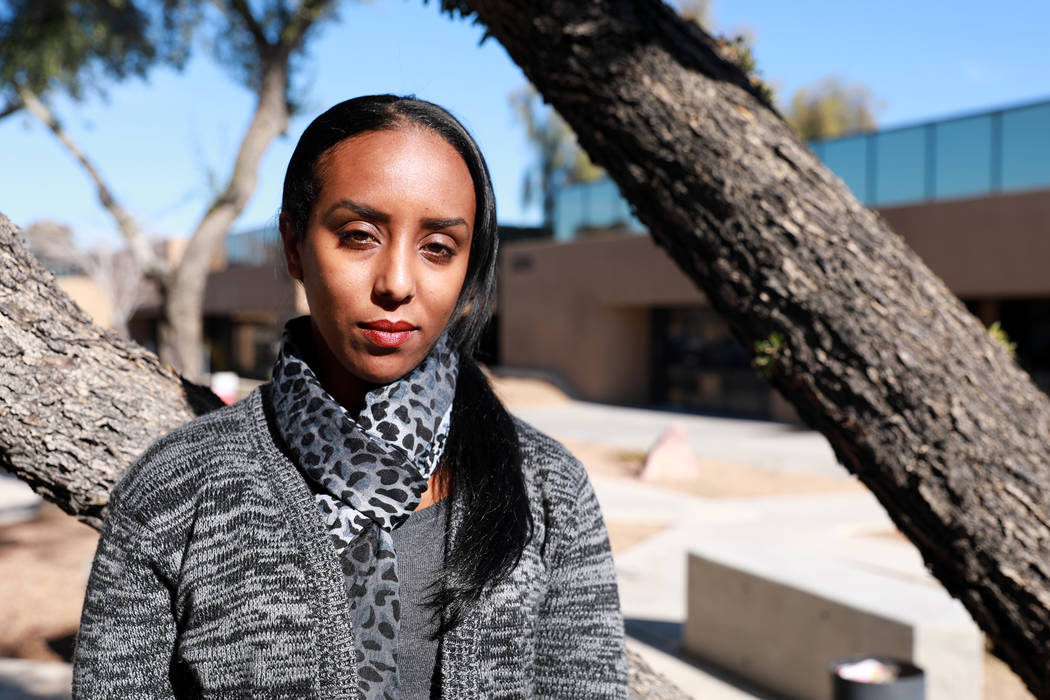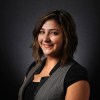UNLV fellow bridges gap between local Jews and their heritage
Nearing the end of her last school year as emissary for the Jewish Agency for Israel and as Israel fellow at UNLV, Rebecca Avera is ready to go back to Israel to share with the other Israelis what she has learned.
She moved to the United States to be an emissary at Stanford University, and then at UNLV in 2016.
“The most important thing to mention is the connections in Las Vegas, Jewish Nevada, and the Israeli American Council in Las Vegas,” she said. “Over here I feel like I arrived home, in a community that loves Israel. Good treatment and a supporting system, which I didn’t have at Stanford.”
Avera, 31, is the daughter of Jewish refugees from Ethiopia but also a Haifa, Israel, native who works to bridge the gap between not only Jewish students and their heritage, but with those from all colors.
“I was born in Israel. I’m Israeli, but at the same time I can’t hide my color, my culture or my background,” she said. “I really had to struggle during the years to figure out who I am and how I can integrate better.”
As part of the Jewish Agency’s emissary program, Avera was picked from a large pool of applicants to secure “vital Jewish future” by creating awareness, knowledge and pride. The emissary aims to bridge the gap between Jews of different backgrounds and promote an understanding of Israel and its ideals, while also leading birthright trips.
There are nearly 300 emissaries in North America, said Tal Lipshitz, directer of the Jewish Agency for the western United States.
“The main goal of having emissaries in the different communities and institutes is to connect Israel to young Jews outside,” Lipshitz said. “And they bring the knowledge and the face of Israel to the community.”
In January, Avera held an event at Temple Beth Sholom where attendees discussed what it’s like to be Jewish while holding other identities. Jews from Russia, India, Mexico and South Africa, were present, as was a Holocaust survivor from Lithuania.
“Growing up in different countries, it shapes our personality,” said Noa Peri-Jensch, regional director of the Israeli American Council. “Now we’re able to strengthen our culture while staying connected to the Jewish heritage.”
Growing up, Avera was so connected to Judaism that it took years for the marks of her Ethiopian culture to come to light.
After her uncle was killed protesting the Ethiopian Civil War, her mother traveled to Israel as a refugee. They were among the first Ethiopians living in Haifa, Israel.
“They see white Jews, and they find it funny,” Avera said of the refugees. “They didn’t know.”
Avera was the only black student in her class.
“I never looked at myself as black; I tried to integrate as much as I could,” she said. “It was really hard for me; I tried the best I could to not be Ethiopian.”
Until she was 18, she didn’t eat Ethiopian food, didn’t learn the language, didn’t listen to the music. She tried to be more like her friends.
“I can be part of the Israeli society and also keep my culture,” she said.
In 2005, when she joined the Israeli Defence Force at 18, she saw a lot of other Ethiopians playing the music and enjoying the food.
“I want to live like that,” Avera said to herself.
In the military, she was drawn into a world of advocacy and telling Israel’s story.
Recognizing that activists who stand for boycott, divestment and sanctions against Israel connect their cause with the Palestinian conflict, Avera has tried to use herself as an example of the diversity, tolerance and opportunity in her homeland.
“Israel is not an apartheid state,” she said. “The stereotype that all the Jews are white people, it’s not true. I’m here to expose them to the beauty of my country.”
Avera said her life was transformed when, just down the street from her Haifa home, a female Islamic suicide bomber blew up Maxim’s Restaurant, killing 21 civilians, including four children.
“That shaped who I am today, and why I do what I do,” she said.
Avera said life experience and personal stories are the best way to explain the truth, and she does so with her stories of Israel. Her goal is to become an ambassador to Israel. But first, she would like to get her master’s degree in her homeland.
“Part of it is to expose people, to educate better and to prevent discrimination,” she said. “The key to get people to realize who you are is to speak out.”
Contact Briana Erickson at berickson@reviewjournal.com or 702-387-5244. Follow @brianarerick on Twitter.























